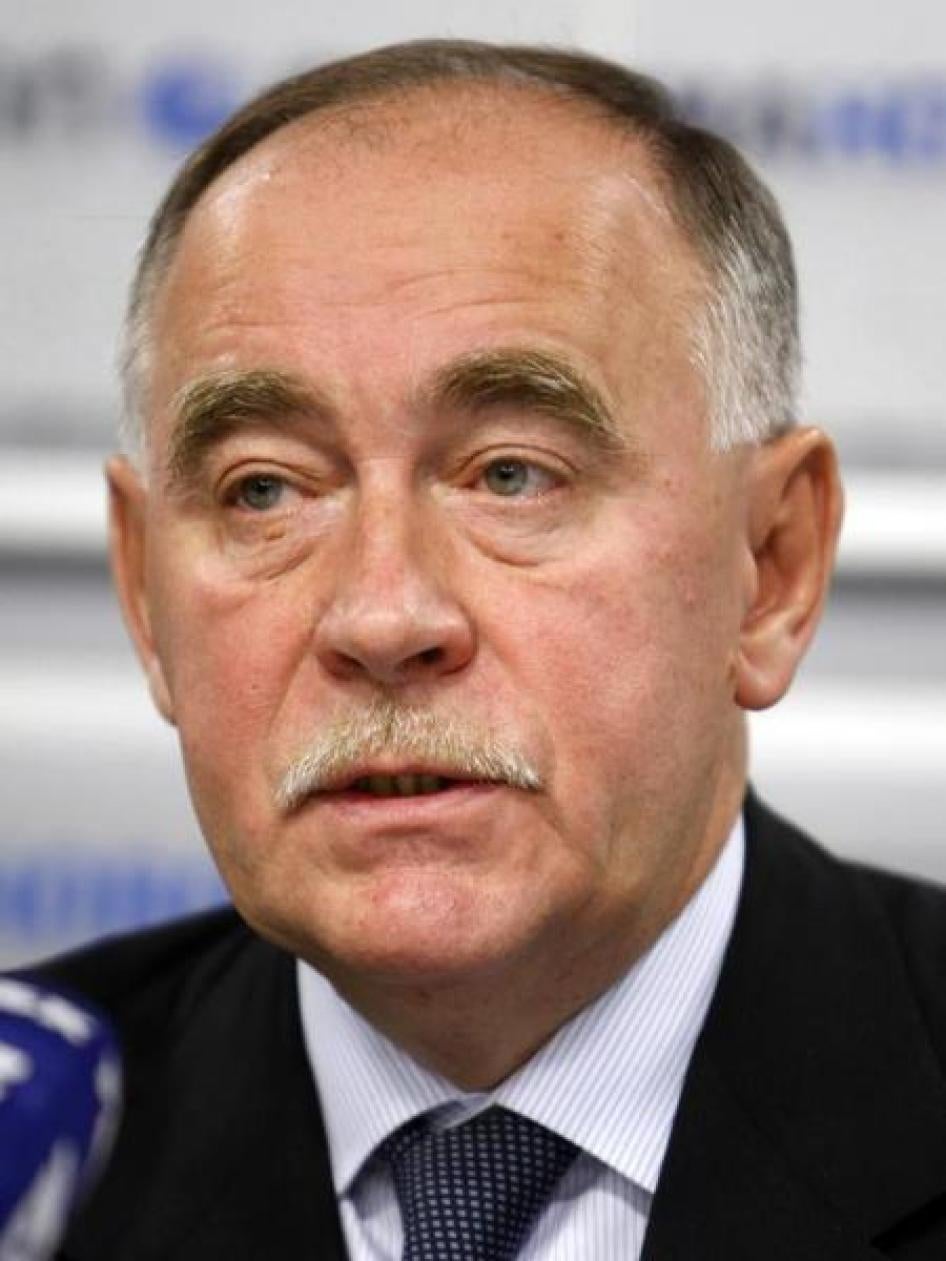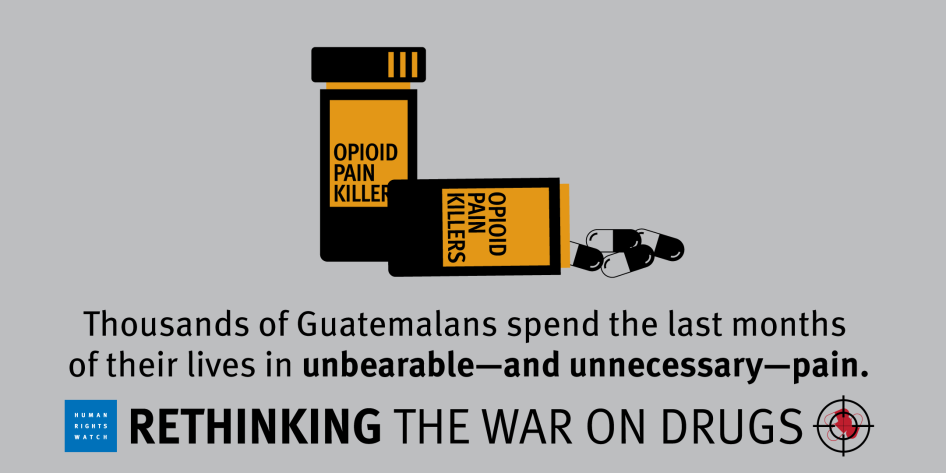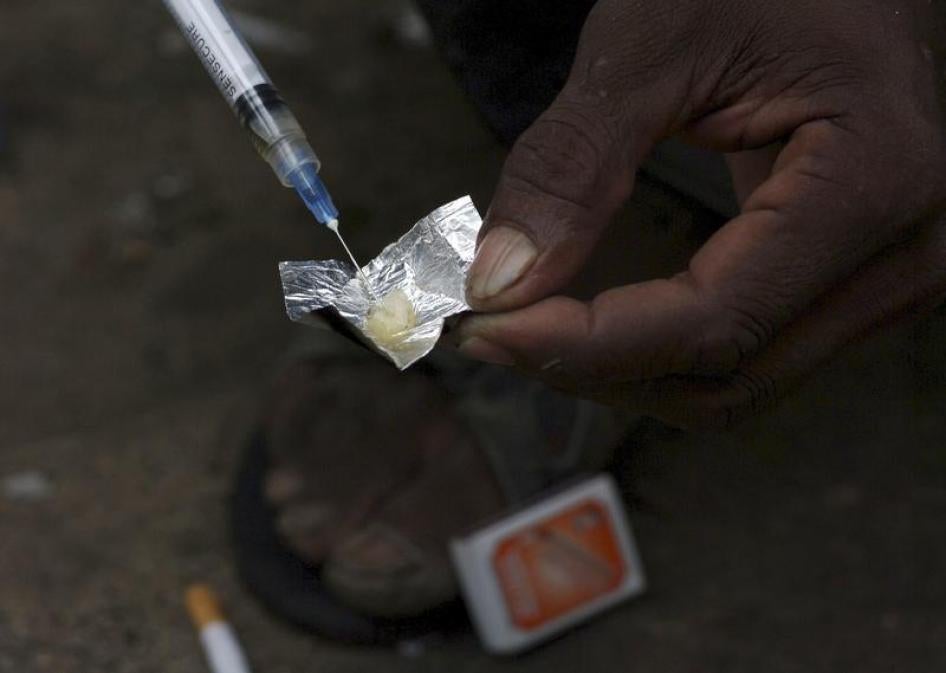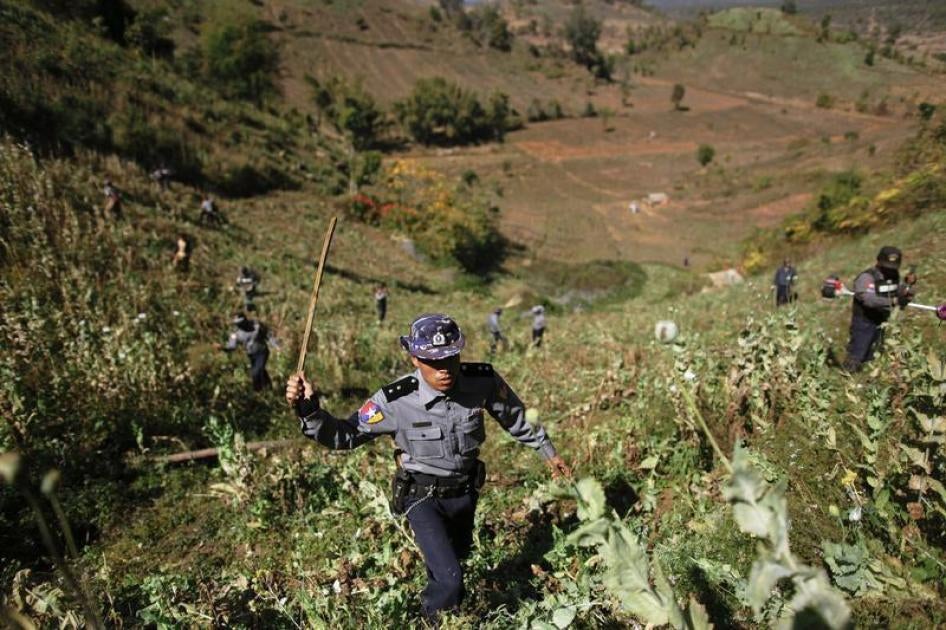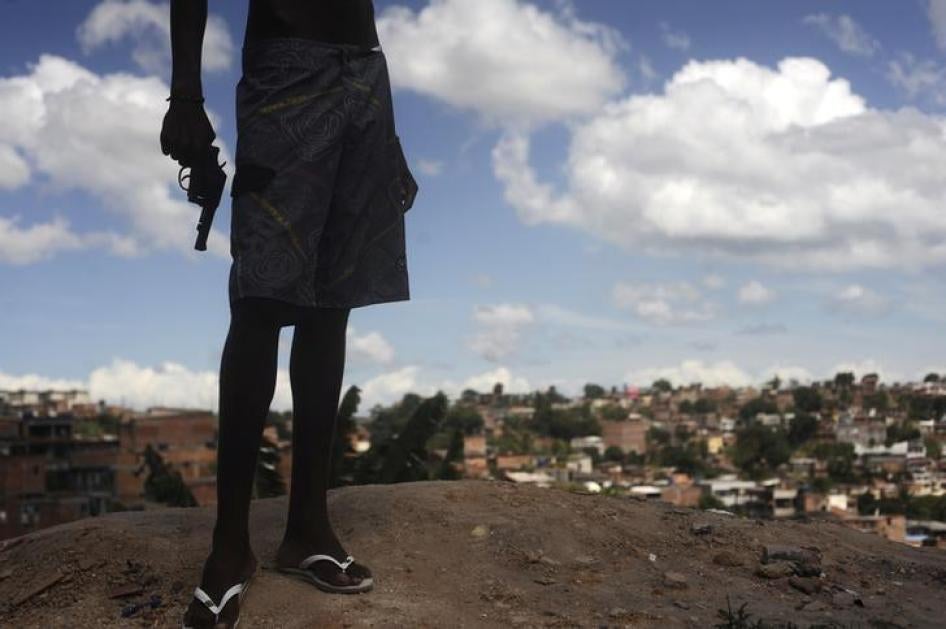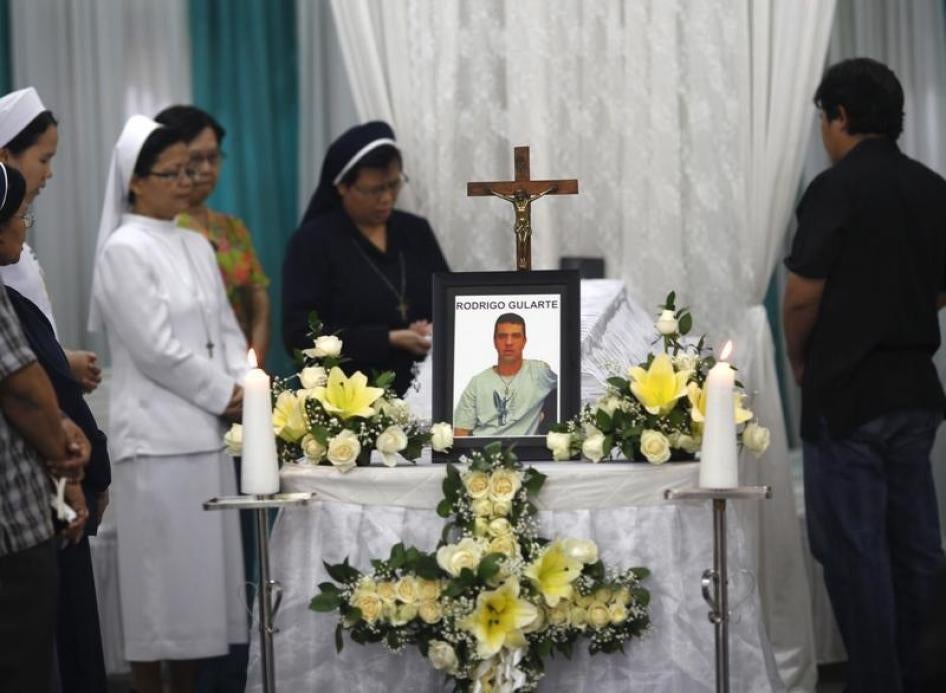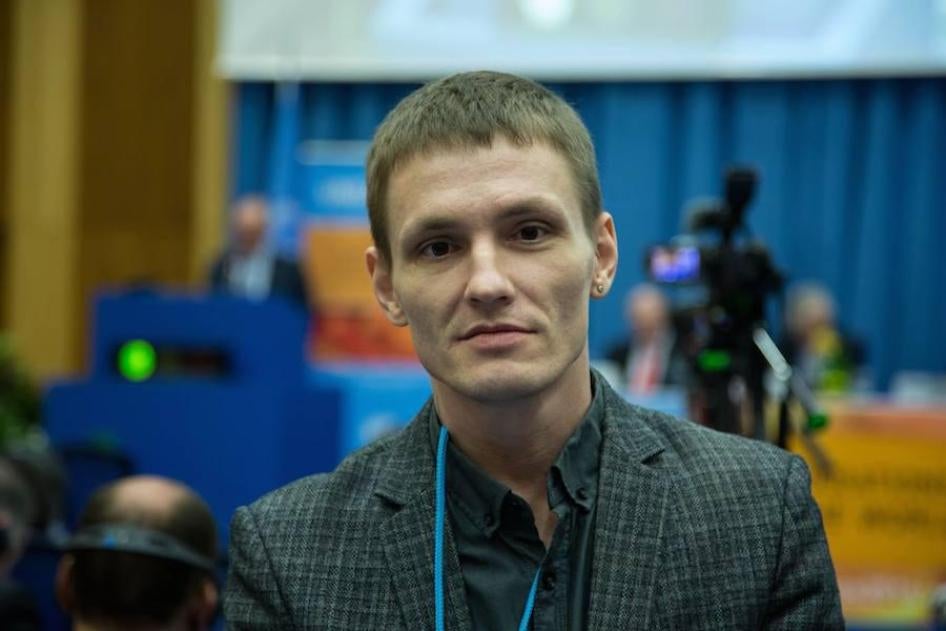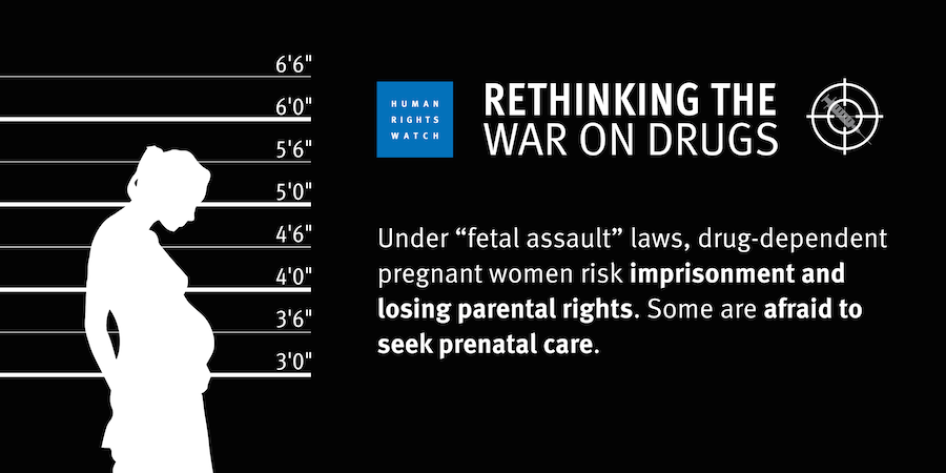Rethinking the War on Drugs
Ending the War on Drugs: A Rights Perspective
For more than fifty years the world has pursued a so-called War on Drugs. Its goal—a world free of illicit use of drugs—has proven elusive: Despite billions of dollars spent, illicit drug use is up and illicit drugs today are cheaper and more accessible than ever before. Moreover, the War on Drugs has had disastrous unintended consequences, fueling the spread of violence, human rights abuses and infectious disease in much of the world. In 2013, Colombia, Guatemala and Mexico, some of the countries hardest hit, called for a special session of the United Nations General Assembly on drugs arguing that “revising the approach on drugs…can no longer be postponed.” This session will be held in April 2016. In the run-up, Human Rights Watch will be publishing a series of articles that will highlight the consequences for respect and protection of human rights of the War on Drugs.
A Missed Opportunity to End the War on Drugs
The biggest United Nations summit on drugs in almost 20 years is over, and while there are signs many countries are stepping back from the destructive “war on drugs” approach to drugs, it’s hard not to conclude that overall the meeting was a missed opportunity.
Three years ago, Colombia, Guatemala, and Mexico called the meeting, arguing that the cost of the “War on Drugs” had become too high and a new approach was urgently needed. Unfortunately, the document the UN General Assembly approved on Tuesday does not represent a real break with the past but rather business-as-usual, with some shifts in emphasis.
The increased focus on health and human rights in the document is welcome, but as long as the dominantly courts-and-cops approach to fighting drugs continues, the toll from the fight will far outweigh the damage from the drugs themselves. There is little doubt that tens of thousands of people will continue to suffer from drug-related violence and human rights abuses in the coming years; that drug users and those involved in minor trafficking will continue to fill our jails; and that HIV and hepatitis C will continue to wreak havoc among people who inject drugs.
The glass-half-full view is seeing the summit as a key step in the long, complicated process of changing the way the world sees drugs. Importantly, the once-unshakable global consensus on the War on Drugs has been shattered. Much to the chagrin of countries that sought to protect the status quo, led by Russia, a critical mass of reform-minded countries powerfully challenged long-standing orthodoxies on drugs and forced open a debate that had been notoriously insular. Decriminalization of personal use and possession – the key to ending widespread abuses against drug users – is now a mainstream issue. Discussion of the benefits and risks of legalization and regulation of marijuana, unimaginable just a few short years ago, is now firmly part of the debate. While falling far short of what was needed, the summit did unleash winds of change that are gathering force.
So what happens next?
In all likelihood, we will see a further fracturing of the approach to drugs around the world. Some countries will continue down the path of reform – legalizing (medical) cannabis, decriminalizing drug use, and favoring effective health over criminal justice interventions – while others will double down on harsh law enforcement approaches. But ultimately the reformers are likely to have the advantage. Their approach is based in science rather than ideology, and the evidence suggests strongly that they will attain the better public health outcomes.
In 2019, the current global drug strategy will expire. The key question is how many countries will by then be willing to follow the evidence even if it necessitates politically inconvenient steps. The human rights of tens of thousands of people depend on the answer.
Drug Users Face Abuse in Russia’s Private Treatment Facilities
Experts estimate that three to six million people use illicit drugs in Russia with the number of heroin users topping a million, according to official estimates. Drug users are stigmatized and jailed frequently for possession of very small amounts of drugs. The hardnosed approach by police prompts drug users in Russia to avoid health services for fear of arrest and harassment.
Guatemala: Where (Legal) Pain Relief is all but Impossible
Guatemala’s regulations on opioid painkillers, essential medicines for the relief of cancer pain, are among the strictest in the world. Doctors must write prescriptions on special forms, which can only be obtained from a single office in Guatemala City, 25 at a time, and each prescription must be approved by the Ministry of Health. Imagine: each time someone needs an opioid prescription filled they must travel to the ministry office in Guatemala City – often hundreds of miles away – during business hours and obtain a validation stamp. Only then can they go to a pharmacy to fill it.
For many patients and their families this is impossible. As a result, we estimate, many thousands of Guatemalans suffer severe, untreated pain in the last months of their lives. “The pain was so intense [at some points] that [my son] would grab his hair screaming and run through the streets calling for help,” the mother of a young man with a brain tumor told us.
Besides the senseless suffering, the excessive bureaucratic requirements pose an acute ethical dilemma for physicians and pharmacists: They are obligated to offer proper care to patients but many feel they cannot do so without stretching – or outright breaking – the law, and exposing themselves to possible disciplinary or even criminal penalties.
We documented examples of health care workers putting themselves at serious legal risk out of a feeling of obligation to their patients. “These patients are literally dying and in pain,” said a pharmacist in Guatemala City who admitted to filling prescriptions not validated by the ministry of health. “I can’t send them to the Ministry of Health on a bus [to get a stamp validating their prescription for morphine].”
A doctor from a rural town said he had stopped writing prescriptions for morphine because “it is practically impossible to get it legally.” Instead, this doctor admitted, he helped patients get morphine on the black market, where it is readily available.
No health care worker should have to risk jail time to prescribe essential medications. No patient should have to suffer needlessly because regulations make it impossible to get necessary medications. It is high time for Guatemala to change its drug control regulations.
Abusing Drug Users in Tanzania
In June 2012, a police officer in Tanzania arrested Mickdad, 28, for carrying unused syringes. Mickdad had just visited an organization providing clean needles and syringes to people who use drugs in an effort to address sky-high HIV prevalence among that group. To the police officer, however, the fact that the government supported this needle and syringe program was of little consequence.
“The sergeant [arrested me and] took me to Mamboleyo Police Post,” Mickdad told Human Rights Watch. “There, he beat me with his hands, a stick, and also [kicked me] with his boots.” Mickdad’s mother had to bribe the officer to secure her son’s release. “Even now I have pain in my spinal cord... I am HIV positive, so when people beat me it’s a problem,” Mickdad said.
The prevalence of HIV among people who use drugs in Tanzania is estimated at 36 percent – dramatically higher than the prevalence of about 5 percent of adults in the country’s overall population. The government has taken steps to address this problem. Tanzania is only the second African country to provide opiate substitution treatment, the most effective form of drug treatment for opioid dependence, and its authorization of needle and syringe programs sets it apart from many of its neighbors.
But the fact that drug use is punishable in Tanzania by up to 10 years in prison undermines these efforts. While prosecutions do occur, many drug users told us that more frequently, police – or members of semi-official vigilante groups – simply rough them up, extort them for every shilling they can get, and release them.
This abuse drives people who use drugs underground, away from essential health services. “The police are a problem,” a health worker said. “In our HIV prevention work, we had to convince them [people who use drugs] that we’re not coming with the police to arrest them.”
In February, police in Dar es Salaam, Tanzania’s largest city, launched a crackdown on people suspected of drug use. Outreach workers told Human Rights Watch that they witnessed police conduct a mass arrest at a camp where heroin users hang out. The outreach workers had come to educate drug users on HIV prevention and harm reduction.
Police harassment undermines government efforts to bring HIV transmission among people who use drugs under control. The Tanzania Network of People Who Use Drugs, an advocacy group, is calling on the Tanzanian government to end arrests and ultimately decriminalize personal drug use. Tanzania should focus on what has been proven to work: harm reduction and expanded access to treatment.
A New Approach to Drug Policy and Human Rights
As world leaders gather this week for the United Nations General Assembly special session on drugs, they would do well to closely examine the Lancet Commission report that exhaustively details the failures of the so-called “war on drugs.”
The report shows how current drug policies have failed to eradicate drugs, reduce the harms of drug use, offer treatment to drug users or ensure access to pain medications. At the same time, these policies have led to massive incarceration and undermined the health of people in many countries. Not surprisingly, the report calls for a thorough reevaluation of international drug policies.
As a member of the commission and a long-term researcher on Burma, I was struck hearing the perspectives of experts from Colombia, Mexico, the United States and African and Asian countries. Burma has been both a major producer and exporter of illicit drugs and is currently beset by a growing epidemic of drug use and punitive eradication efforts. Many of the experts spoke of the same disastrous approaches to drug control I have seen in Burma: policies that view drug policy largely as a crime issue. This approach has clearly failed as drug production, illicit use and its effects on domestic crime, health problems and drug-related violence have only expanded in recent decades in regions such as Latin America.
The commission suggests policy solutions that are being debated more openly now than in previous years, especially in regions where drugs have had a disastrous social impact. These include decriminalizing minor drug offenses such as petty use and sale, reducing the violence of drug policing, and making harm reduction a central pillar of health services and drug policy. It recommends that UN member countries also need to integrate health, human rights and development concerns into drug policy planning; make greater investment in treatment for drug users; end involuntary detention; ensure access to controlled medicines; develop specific policies to reduce harm to women: and fund research on drug policies and their impact on human rights.
The theme of this week’s drug summit is youth and young people, a perfect opportunity to agree on new approaches informed by evidence and guided by human rights norms so we don’t burden another generation with the predictable results of rigid and abusive approaches to dealing with drugs.
Brazil’s Senseless ‘War’
On February 2, 2014, Alda Castilho, a 27-year-old military police officer died after suspected drug traffickers opened fire on her squad in a shantytown in Rio de Janeiro. “Her death was in vain,” her mother, Maria Rosalina da Silva, told us last month.
Castillo was one of the almost 60,000 homicide victims in Brazil in 2014. It is unknown how many were the victims of drug traffickers. In Niterói, São Gonçalo and Itaboraí, three cities within Rio de Janeiro´s metropolitan area, about 400 of the 480 homicides in 2014 were drug-related, estimates Fábio Barucke, the Civil Police’s chief of homicide investigations in that region.
Brazil’s approach to criminalizing drug production and distribution has fueled the growth of criminal organizations and weakened the rule of law.
The “war on drugs” is the main driver of police operations in shantytowns, which often end in death. Brazil´s police killed more than 3,000 people in 2014, according to official data. While the police routinely say these deaths resulted from shootouts with criminals, Human Rights Watch has documented dozens of cases in the last decade in the states of Rio de Janeiro and São Paulo in which the evidence strongly suggests they were extrajudicial executions. In some instances in Rio de Janeiro, according to prosecutors and police officers Human Rights Watch interviewed, corrupt police officers involved with drug traffickers committed the killings.
Apart from contributing to the spike in homicides and the strengthening of deadly gangs, Brazil’s “war on drugs” has also failed to achieve its objectives. Drugs are more plentiful now and stronger than in the 1970s, when the United States began pushing the rest of the world to fight the illegal drug trade.
Police officials described to us the futility of anti-drug operations. Military Police Major Roberto Valente, for example, told us that if they capture a low-level operative, such as a lookout, his gang will give him a gun and promote him once he leaves prison.
Often, top traffickers simply continue their trade from prison. If the police kill them, they are likely to be replaced before the body is stiff.
Having suffered so much in the name of fighting drugs, Brazil should encourage a new approach during the UN´s Special Session on this issue, which starts today in New York. It is time to decriminalize possession of drugs for personal use and to take a look at legalizing drugs.
Opponents of decriminalization argue that it will increase drug use, but the experiences of other countries do not support that assertion. In Portugal, which decriminalized possession of drugs for personal use 15 years ago, the number of people dependent on drugs decreased, as did HIV transmission among drug users and incarceration rates.
Some countries are trying out the legalization of production, distribution and use of marijuana, the most commonly used illegal drug. Early evidence suggests this may cut into the profits of drug traffickers without firing a single bullet. Brazil should consider doing the same.
A new approach to drugs may save the country millions of reals that could be used for drug treatment and the prevention of violence. Most important, it could save thousands of lives every year. It is time to put an end to the current senseless policy.
Why Asia’s Drug Detention Centers Need to be Shuttered
Human Rights Watch has spoken to hundreds of people who use drugs throughout China and Southeast Asia. Typically soft-spoken and polite, despite the many hardships they had suffered, these people rarely sounded bitter – except when describing their time in government drug detention centers.
Indonesia’s Drug Trafficker Executions Aren’t Over Yet
International human rights law is absolutely clear: Countries should not use the death penalty for drug-related offenses. Yet, Indonesia’s Minister of Foreign Affairs, Retno Marsudi, recently confirmed that her country would continue to put drug traffickers to death due to the country’s “drug emergency.”
The Dark Ages of Drug Treatment in Russia
It is bad enough that the Russian government denies opium users one of the most effective dependency treatments – methadone, a drug used to treat people dependent on heroin. Now, Russia’s government is targeting drug users who sue for their health rights in court.
Alexey Kurmanaevsky, a social worker, found this out the hard way.
Kurmanaevsky has a long history of opioid dependence. He has repeatedly sought help from Russia’s public clinics, but frequently relapsed into drug use shortly after – not surprising as treatment in these clinics ignores scientific evidence of what works and what doesn’t.
As a result of injecting drug use, Kurmanaevsky is HIV positive.
Between 2011 and 2014, he and two other Russians struggling with drug dependence filed an application with the European Court of Human Rights, arguing that banning opioid substitution therapy violates international human rights law.
In 2014, the European Court informed the Russian government about the case. The fallout for Kurmanaevsky and his fellow plaintiffs happened rapidly. Kurmanaevsky, at the time in remission, was working as a peer counselor at a state-funded drug rehabilitation center, the Health Country Foundation. One day, his boss called him to say that a government official had been in touch. The official told his boss that Kurmanaevsky’s employment at Healthy Country “damaged” its reputation. His boss then ordered Kurmanaevsky to withdraw the European Court case and publicly admit that he had been mistaken regarding substitution therapy. Otherwise, he had to cut ties to Healthy Country.
Kurmanaevsky refused and lost his job. The other applicants to the European Court were also pressured to drop the case by authorities, they said. When the employer of one of them, a nongovernmental organization, refused to yield, the organization suddenly faced inspections and fines that have paralyzed its work.
Evidence is mounting that Russia’s punitive approach to drugs does not work – the number of drug related deaths has remained steady recent years and 70 percent of Russia’s inmates are drug users. At the same time, the government has grown increasingly intolerant of critics. Using vaguely worded anti-drug propaganda laws, it has censored public discussions regarding substitution treatment.
Now it has also evidently decided to go after those who go to court to protect their rights.
But Kurmanaevsky is going forward with the case. He hopes the European Court of Human Rights will decide in his favor and force Russia to enter the 21st century when it comes to treating opioid dependence.
Criminalizing Drug Use By Pregnant Women Increases Harm
Imagine a law that makes pregnant women afraid to seek prenatal care or go to a hospital to give birth. Crazy? In fact, that’s exactly what is happening in numerous U.S. states.
In 2015, I researched the impact of the Tennessee law criminalizing the use of certain drugs by pregnant women. Under child welfare law, healthcare providers may test women for illegal drugs and, if found positive, report them to child services, which may then alert law enforcement. As a result, these women may go to jail on charges of “assault” –ostensibly on the fetus—and risk losing parental rights.
These laws try to address a real public health issue: Children born to mothers who are drug dependent may develop conditions such as neonatal abstinence syndrome, a temporary and treatable health condition that results from prenatal exposure to opioids. But our research shows why a criminal justice approach is the wrong way to tackle this problem. Rather than protecting the health of the women and their children, we found that this approach makes things worse by prompting drug-dependent women to avoid healthcare entirely.
I interviewed women who gave birth in circumstances that were dangerous to themselves and their child. One woman described being in labor while her partner quickly looked up how to do a home birth. Some women said they tried to detox at home—something that can actually put the health of their pregnancy at greater risk than the use of illegal drugs itself. A gynaecologist told me some of her drug dependent patients were showing up later for prenatal appointments or simply stopped showing up at all.
The fact that there are few affordable drug treatment facilities in much of the US—especially ones that accept pregnant women—and some may only accept certain insurance policies, makes these laws particularly unfair. How can a woman with drug dependence enter into treatment when it is not available or accessible? A woman from east Tennessee told me she called drug treatment providers across the state but was unable to find any that would accept her insurance. She tried to leave the state when she went into labor but did not have enough time; she ended up giving birth on the side of the road.
In Tennessee, about 100 women have been charged under the “fetal assault” law since 2014, mostly in rural eastern Tennessee, an area severely lacking in drug treatment facilities, and in Memphis, a majority African American city. In Alabama, almost 500 women have been arrested under a similar law. More than three-quarters of US states have such laws in place and prosecutions have occurred in most.
Confronted with the detrimental impact of its law, Tennessee recently decided to let some of the most harmful provisions expire in July. Other states should follow suit and repeal such laws. Instead of criminalizing women who use drugs they should offer them meaningful access to affordable drug treatment and other drug-related health care without discrimination. Such approaches that make pregnant women facing drug dependency feel safe to seek treatment and prenatal care lead to better health outcomes for women and their children.
